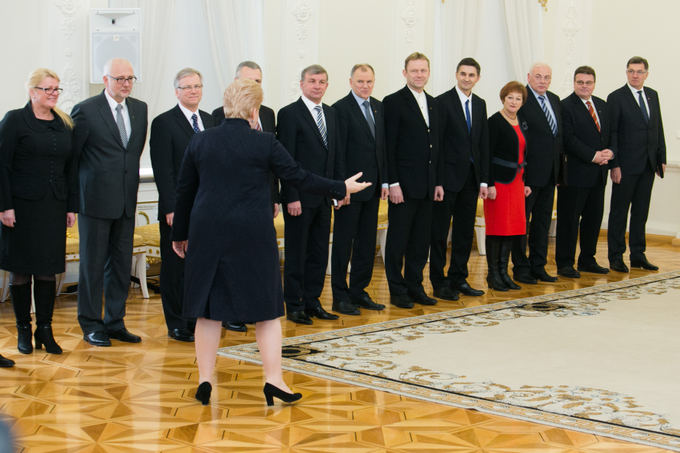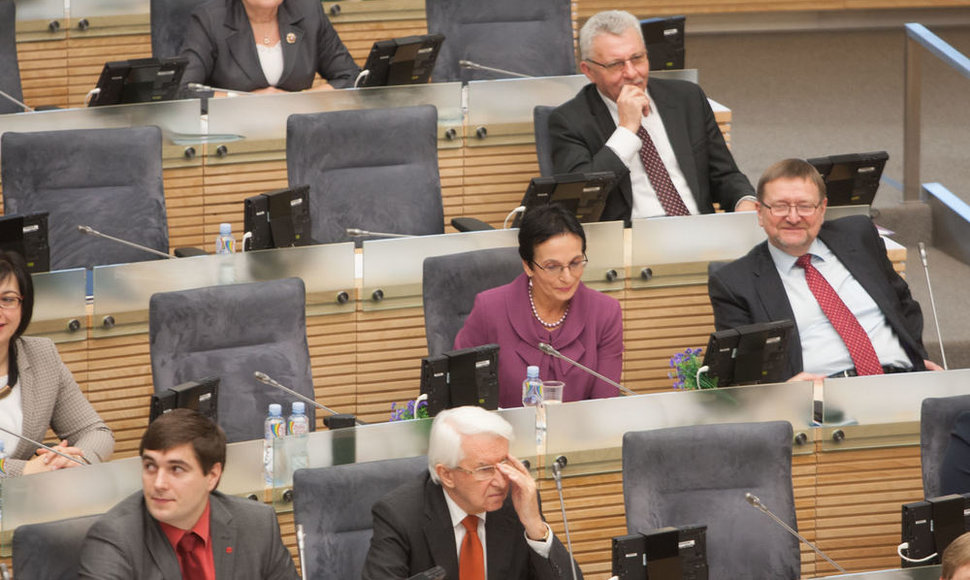International prizes and Lady Gaga
Historian Alfredas Bumblauskas thinks that the most unexpected event of 2012 in Lithuania must have been the prestigious Charlemagne award bestowed upon President Dalia Grybauskaitė. Only four politicians from Central and Eastern Europe have been thus honoured so far.
 |
| Juliaus Kalinsko/„15 minučių“ nuotr./Alfredas Bumblauskas |
“Since it is coming from Germany, the powerhouse of the entire EU, it is a great opportunity to realize the message that Germany is sending us. I see it as a very positive thing, even though there are things in the President's foreign policies that I do not like. It is a veritable acknowledgement of Lithuania and even the entire Baltic region for its beating the crisis – after all, we managed to escape the fate of Southern European states that cannot pay off their debts,” Bumblauskas says.
The historian believes that 2012 was a dull year, but, says he, so is Europe that we aspire to without realizing that the old continent is not quite what it was and what we still imagine it to be. Europe is changing, says Bumblauskas, and that sometimes makes Lithuania flounce about without any apparent direction.
To prove it, Bumblauskas points at the titles of causes that the year has been dedicated to. 2012 was announced the Year of (Lithuanian 19-century romantic poet) Maironis, but also the Year of Museums, the Year of the Blessed Jurgis Matulaitis (Catholic priest and Bishop of Vilnius), the Year of ageing in Europe and solidarity among generations. “What is happening here? No priorities, a melange that leads us to nothing worthwhile, only to the kind of parliament that we've elected – a systematic buffoonery, nothing less.”
The historian does give credit to the last Government for its stability (the only in the modern history of Lithuania to last the entire 4-year term), even though he cannot ignore the fact that the country sunk deeply into debt during its time. Nor is he very optimistic about the new Social Democratic government, since “all political analysts agree that the Social Democrats are a solid party, but they are forced to run the country with partners that hardly anyone could have even dreamt of a decade ago.”
“I sometimes joke that, next to all this talentless political buffoonery of ours, the most significant event was the concert of Lady Gaga. Someone well remarked: Lady Gaga came to Lithuania not like Suzi Quatro, when she was 62, but at 26, at the prime of her career. That alone might be a proof that we aren't a province after all,” Bumblauskas sums up the year.
Denouement of the paedophilia scandal
After balancing on the verge of sanity for the last several years, the story of the so-called paedophilia case finally reached a turning point in 2012. The 8-year-old girl, who had been living in her aunt's house surrounded by a mob of self-appointed justice seekers, was handed over to her mother Laimutė Stankūnaitė in May. Half a year later, the man who was suspected of having abused the girl, late Andrius Ūsas, was acquitted by a court.
 |
| Eriko Ovčarenko/15min.lt nuotr./Garliava |
Even though a court ruled back in 16 December 2011 to award the girl's custody to her mother, her aunt and provisional guardian Neringa Venckienė defied the court order and refused to hand the girl over.
In the early hours of 17 May, 240 police officers stormed Venckienė's house in Garliava and Stankūnaitė, accompanied by her lawyer Gintaras Černiauskas, carried the girl out. Venckienė had to pay a fine of 27,800 litas for defying a court order.
Child development specialists later testified that the 8-year-old was feeling well and was provided with proper care by the mother.
Meanwhile Venckienė ventured into politics. The party she founded, the Path of Courage, crossed the 5-percent threshold and qualified for seats in the Seimas.
On 30 November, Vilnius District Court acquitted late Ūsas who had been accused by the girl's father Drąsius Kedys (who also passed away since) of having abused his daughter. However, Child Rights Protection Services appealed against the ruling, seeking to conclusively ascertain weather the girl was sexually abused and by whom.
Passionate parliamentary elections
In October 2012, the eleventh general election had a turnout of almost 53 percent. Hardly impressive, yet the number of parties running for parliament was record-high this time, 27.
 |
| Irmanto Gelūno/15min.lt nuotr./Valdemar Tomaševski, Algirdas Butkevičius, and Viktor Uspaskich |
In the first round, success favoured the Labour Party, followed by the Social Democrats and the conservative Homeland Union.
The run-off ballot changed the balance of power somewhat. Amidst meagre turnouts, the Social Democrats came in first, beating Labour and securing 38 seats in the 141-seat Lithuanian Seimas. The conservatives were second, with 33 seats. The Labour Party claimed 29 seats, the Order and Justice Party, 11, the Liberal Movement, 10, the Electoral Action of Poles, 8, and the Path of Courage won 7 seats.
In all, the Lithuanian voters have elected 140 MPs, of whom 33 are women and 107 men. The average age of the candidates was 52.8 on the day of the ballot, 14 October. The Seimas has aged considerably.
The recent ballot gained notoriety for a number of conspicuous cases of vote rigging. Labour candidates dominated police reports. As a result, election results in two single-member constituencies were declared null and void. The constituencies will hold a second ballot in March. A third one, Ukmergė constituency, will also have to elect a new representative, after its original choice, Julius Veselka, unexpectedly passed away on 26 November.
Hopeful youth
Between 12 and 15 July, over 3,500 people from 30-odd countries assembled in Vaizgakiemis, Prienai District, to World Lithuanian Youth Meeting, a large-scale festival of science, business, politics, and culture.
 |
| Eglės Digrytės nuotr./PM Andrius Kubilius in World Lithuanian Youth Meeting |
The events schedule included a number of presentations, discussions on business, science, culture, and politics; also creative workshops, sports competitions, meetings with dignitaries of various spheres of life, networking and career fairs.
The intent of the conference was to encourage and enable young Lithuanians, many of whom study or work abroad, to apply their experience in Lithuania. Also to show the ever-growing expatriate community that they are still part of and needed by their home country.
Organizers of the conference say the event was extremely successful – attendance exceeded all expectations and included many motivated and bright attendees who actively contributed to the discussions.
Forming the Government: Do you speak English?
After prolonged deliberation, President Dalia Grybauskaitė invited Social Democrat Algirdas Butkevičius to form the Cabinet. Butkevičius had previously declared he would be forming a coalition with the Labour Party and the Order and Justice Party. In the end, the trio was joined by the Electoral Action of Poles.
 |
| BFL/Lithuania's 16th Government |
Grybauskaitė presented Butkevičius with a condition: the would-be Government was not to include the Labour Party, which was and still is under criminal investigation for double bookkeeping and tax evasion. The Prime Minister, however, stood his ground, only conceding that Labour leader Viktor Uspaskich, himself a suspect in his party's case, would not be appointed to any government posts.
The President also insisted on examining the ministerial candidates' command of the English language. She interviewed several candidates in English, while some others left her office within several minutes of their arrival. The President was more or less happy with the candidates proposed by the Social Democrats, the Order and Justice Party, and the Electoral Action of Poles, while the Labour Party had to come up with new names almost daily. Some of the proposed candidates seemed like a joke and mockery.
The protracted process of government formation was finally concluded on 12 December, when the President signed a decree, appointing the 16th Government of the Republic of Lithuania.












